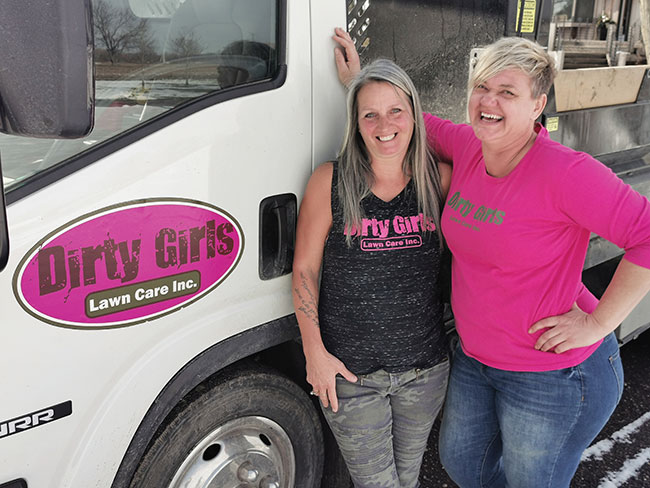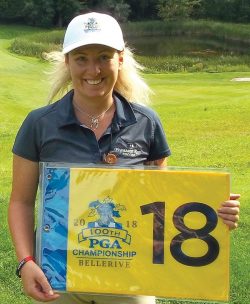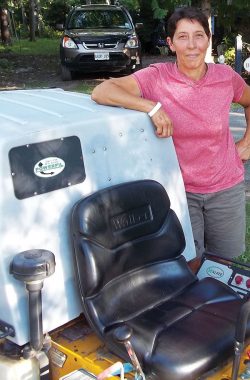
Features
Profiles
Women in Green
Women in green
Female turf professionals share their stories.
March 24, 2020 By Mike Jiggens
 Teresa Patterson, left, and Ellie Kop of Dirty Girls Lawn Care in London, Ont. Kop founded the all-female lawn care business 20 years ago, and Patterson has been her longest-serving employee at 17 years.
Teresa Patterson, left, and Ellie Kop of Dirty Girls Lawn Care in London, Ont. Kop founded the all-female lawn care business 20 years ago, and Patterson has been her longest-serving employee at 17 years. It’s becoming less of a man’s world in the professional turfgrass industry. Although the industry is still male dominated, more and more women have entered the profession the past number of years, and some have reached its upper echelons as lawn care company owners, landscape contractors or golf course superintendents.
These women have risen through the ranks for a number of reasons – their work ethic, their attention to detail and the pride they take in doing a good job.
Turf & Rec recently interviewed four women of note who have made names for themselves in their respective fields. Two are veterans of the industry, having been working professionally for 20 or more years. Another has experienced a meteoric rise to the top at a relatively young age.
The common thread among all of these women and the reason they entered the turfgrass profession in the first place is a love of the outdoors. The women are sharing their stories with us in a two-part podcast series that will soon be uploaded to our website (www.turfandrec.com). For now, however, we’d like to share with our print readers some of the highlights of what they had to say.
Ellie Kop and Teresa Patterson
Twenty years ago, Ellie Kop founded Dirty Girls Lawn Care in London, Ont. Working as a bartender at that time, her passion for gardening inspired her to set out on a new journey. With five residential lawns and two commercial plazas she maintained, the work was only part-time at first. Her fleet of equipment initially consisted of a walk-behind mower, a borrowed trailer and a borrowed truck.
In just a few short years, however, the business began to snowball. What was unique about Dirty Girls was that the business was an all-female operation. Outfitted in neon pink shirts, Kop and her crew attracted plenty of attention, but it was the quality of their work that was noticed most.
Over the past 20 years, the business has grown exponentially to the point where Kop can’t keep up with the telephone inquiries. Several add-on services have been incorporated over the years, including winter snow removal – the one aspect of the business that includes some male workers.
She said her customers tend to be more comfortable with women looking after lawn maintenance work. The 13 seasonal employees on her team look and act professionally while on a job site, with no smoking or swearing permitted.
“We want to set a good example for women,” Kop said.
Teresa Patterson, who has been Kop’s longest-serving employee and is her right-hand woman, said customers have told her that women tend to pay closer attention to the finer details of gardening and lawn care. She added that many of Dirty Girls’ female customers live alone and feel safer with a crew of women tending to their maintenance needs.
“Older ladies don’t want people knowing they live by themselves,” she said.
Kop said that women tend not to let their egos get in the way and have a softer edge to them that customers appreciate.
“You have to like it and do a good job because you’re not going to feel good if you do a job that’s half-assed,” she said. “You have to have a bit of fire in you. While you’re doing it, care about it.”
Patterson, who has been with Dirty Girls the past 17 years, credited Kop’s success to her personality and work ethic, adding women contemplating entering the profession could follow her lead.
“Do what you’re able to do to the best of your ability,” she said. “Be detail orientated and care about what you’re doing. It’s a gratifying job if you love what you’re doing.”
Finding the right people for the job continues to be Kop’s biggest challenge. Most employees over the years have worked for the business while pursuing a post-secondary education, but then move on to other careers. Lasting friendships have been made among those who move on, she said.
“We mentor them and give them life skills.”
Kop said that what might have been more of a curiosity at first among her peers in the industry has transcended into a business that is being taken seriously by both her competitors and her suppliers. She said this is especially true when purchasing equipment and materials.
When founding Dirty Girls in 2000, “I couldn’t foresee that things would be the way they are today.”
Leasha Schwab
Leasha Schwab’s ascension to the top of the golf industry happened quickly. She became a golf course superintendent at the tender age of 21 and is currently in her third superintendent’s position at Pheasant Run Golf Club in East Gwillimbury, Ont. Two years ago, she was named to Turf & Rec’s inaugural class of the Top 10 Under 40.
Having grown up on a farm, the desire to work outdoors was her lure into the golf profession. Still, her journey into the industry has meant working alongside mostly men.
“All my mentors have been men,” she said. “They support me through and through.”
In spite of the support she has received over the years from her male colleagues and subordinates, it hasn’t completely been a smooth ride, she admitted. A while back, she was forced to go through the Ontario Golf Superintendents Association to deal with an online harassment situation directed toward her. It marked the first time she felt she had the ability to do something about being harassed and not to simply ignore it.
“I don’t want this in our industry,” Schwab said. “I don’t think young girls should have to deal with this. The situation was quite egregious and, if I had been younger, I probably would have left the industry.”
She said she wondered if similar situations were common among other young women in the industry, but added she was able to deal with the matter in a satisfactory manner because of her network of support.
Schwab said she has maintained an “amazing” relationship with her staff, including some who have followed her from golf course to golf course. She admitted that when she first became a superintendent she thought she might have to act “rough and tumble” before her staff, but treating everyone fairly has been the key to maintaining a positive outlook by everyone and it helps make the golf course better.
“Don’t feel forced into having to be one of the boys,” she suggested. “We really don’t have to do that. It can degrade your leadership if you aren’t being genuine to yourself. That would be a word of caution.”
Three years ago, Schwab became involved in an initiative for women in golf at the Golf Industry Show, put on by the Golf Course Superintendents Association of America. At first a women-only event, the forum opened the door for men to attend in its second year, and this year it attracted a large male following.
She offered a simple bit of advice for women who might consider a career in the professional turf or golf industry.
“Be outspoken with your goals because generally your superintendent or people you meet will help you. Women can sometimes just sit back a little bit.”
People who are outspoken tend to want to learn, she said, and others are usually receptive to that.
Melissa Baldelli
Melissa Baldelli was first introduced to the landscaping profession about 23 years ago before launching her own business – Cut and Style by the Lawn Salon – a dozen years ago.
“I really, really found I loved being outside all the time,” she said. “The work was hard, but it was good for me. I lost weight.”
Wanting to learn more about landscaping when she first entered the profession, her original employer mentored her about the various aspects of the trade, and she eventually set off on her own to tend to a number of high-end properties in the Mississauga, Ont. area.
Now 58, Baldelli said she still feels good and has no immediate plans to stop. She said the relationships she has developed with her customers account for much of the reason she wishes to continue in the industry.
As a one-person operation, she admitted the physical demands of the job can be trying, but that has helped to make her stronger.
“But then I started getting older and you notice how hard the job actually is, but you can improvise.”
Attracting work was never a problem for Baldelli, who said prospective customers came to her until it reached the point where she had to turn many away.
“You don’t want to take on more than you can do because you want to serve the clients you have the best you can.”
Baldelli has opted to slow down her contracting business and has taken on a part-time landscaping job a little closer to home that has allowed her to cut back on her travel. Additionally, she works for another contractor during the winter months to help with his snow removal business.
Her customer services with her own company include turf maintenance, pruning, organic fertilizing, gardening and interlock paver repairs. As long as she has the necessary equipment, she said she tries to accommodate whatever needs are requested by her customers.
“Pleasing them is the most important part. When you work on your own, you notice that they do watch you, but if you’re doing what you’re supposed to do there’s no worry.”
Baldelli said she has seen a larger influx of women in the landscaping industry in recent years. Her advice to women interested in entering the profession is to first pass the “guy test.” This means doing the things a landscaper asks to be done.
“I was asked to do a lot of crazy things when I first started.”
The door is opening wider for more women to enter the profession due to technological advances in landscaping equipment.
Baldelli said today’s tools are superior to the equipment she used many years ago, and are both lighter in weight and more ergonomic. Several years ago, she said she developed carpel tunnel because of heavily vibrating handheld tools.
Print this page

